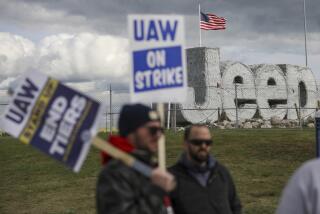‘They Never Complained’ : Lives of Black Steelworkers Detailed
- Share via
PHILADELPHIA — Dennis C. Dickerson said that when he began researching the American black steelworker, he was surprised to learn of what his own father, grandfather and great-grandfather had gone through.
“They never complained, they were not bitter,” said Dickerson, 35, author of “Out of the Crucible,” a history of black steelworkers in western Pennsylvania from 1875 through 1980.
“What surprised me most,” he said, “was the depth of resistance to black steelworkers’ making significant progress.”
Even his own experiences in U.S. Steel’s Duquesne Works during the late 1960s, as he worked his way through college, had not prepared him.
“I made good money,” he said, but not good enough to keep him out of school. Dickerson now counts that as extremely fortunate, because later, both he and his father were able to escape the bleakest years when the steel mills went idle and the unemployment lines grew.
Big Mills Collapsed
The early 1980s will be remembered as a time of deep economic recession. For Pennsylvania’s King Steel, it was a time of collapse. Recession and inflation in the United States drove business overseas. The giant mills faltered, then closed.
Dickerson earned his four-year degree at Pennsylvania’s Lincoln University and decided to follow an academic career. He is now on the faculty of Rhodes College in Memphis, Tenn. It was while he was at Washington University that he decided to write his doctoral thesis on the black steelworker.
He found that little information had been organized. He went through obituaries in the Duquesne paper to find a beginning. The thesis grew into a book as Dickerson uncovered more and discovered how little was being saved.
A letter to President Franklin D. Roosevelt from one Alvin Nunley, a black man laid off from Crucible Steel’s Pittsburgh plant, told best the pattern that developed as steel companies wooed black workers in times of labor strife and boom, then dumped them when things were going well, Dickerson said.
Unions Share Blame
Unions too alternately sought and neglected the blacks, Dickerson added. He said his father’s union activism contributed to his own positive recollections of his youth and his father’s work. It was during that period that blacks made their greatest strides toward social equality.
Nunley’s letter to Roosevelt was written in January, 1938, just after Crucible had signed a new contract. Dickerson said he found it in the National Archives.
“They put me in hot places all summer, where not many men will stay; when it gets cool, they layed me off; white men get my job . . . . I have went to see the employment manager of the mill (and) all he says is their is no call for colored men.
“He has sent me to place I have worked as good as any other man, but I can’t get a job steady, on account of I am not a white man. I don’t think it fair. I have a right to a living as well as anyone else, no matter what color I am.”
Struggle Is Focus
This struggle, Dickerson said, is what his book is all about.
“There are experiences here that need to be on the record. They should not be trivialized,” he said. “Possibly, in knowing what happened, this will help all of us begin to understand the consequences.”
The consequences, he said, are the state of the industry today: Finally, there is absolute equality between black and white steelworkers.
“Oh, yes. It’s there now. In the unemployment line,” he said.
More to Read
Sign up for Essential California
The most important California stories and recommendations in your inbox every morning.
You may occasionally receive promotional content from the Los Angeles Times.










